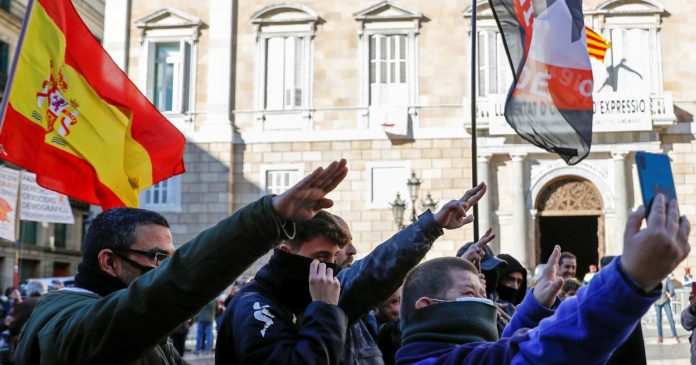[ad_1]
When Ignacio Garriga, the principal candidate for the far-right Vox party in Catalonia’s upcoming regional elections, launched his campaign last Thursday, he lashed out at Salvador Illa, his Socialist Party rival who recently resigned as health minister.
“Inept and irresponsible, Salvador Illa is behind the negligent and criminal management of the pandemic,” Garriga said.
“That management can be summed up in two words: death and ruin. And I’m going to repeat that because I know many of you watching from home have been saying that for months: death and ruin.”
Garriga’s apocalyptic tones, coupled with his reminder of how long the COVID-19 crisis has now lasted, may have boosted Vox’s chances of garnering support from some Catalan voters who are exhausted by the remorseless impact of the pandemic and looking for someone to blame – or to give it a shorthand description, pandemic fatigue.
And with far-right parties currently on the rise in a significant number of European countries, how that general fatigue can push voters towards the likes of Vox could shape the political landscape on the continent for years to come.
Far-right parties make gains across Europe
In Portugal’s recent presidential elections, when only 30 percent of the general public were cooperating with COVID-19 restrictions, the Chega party’s vote share of 11.9 percent completely eclipsed the 1.3 percent it garnered in the previous general elections, in 2019.
On the other side of Europe, last December, the Alliance for the Unity of Romanians (AUR) emerged from complete political obscurity to take 9 percent of the vote in the general elections and become the fourth-largest party in Romania’s Parliament.
Again, pandemic fatigue was among the factors attributed to its significant increase.
Then there is the far right’s remorseless rise in the polls in some big European countries.
In France, one of the most recent projections of the possible outcome of the country’s upcoming presidential vote in 2022 has seen far-right leader Marine Le Pen make a record surge in popularity to reach near-parity with incumbent Emmanuel Macron.
 Marine Le Pen, leader of France’s National Rally party attends a news conference with Portugal’s far-right presidential candidate Andre Ventura in Lisbon, Portugal, January 8, 2021 [File: Pedro Nunes/Reuters]
Marine Le Pen, leader of France’s National Rally party attends a news conference with Portugal’s far-right presidential candidate Andre Ventura in Lisbon, Portugal, January 8, 2021 [File: Pedro Nunes/Reuters]
Across the border in Italy, the Fratelli d’Italia party has doubled its support compared with a year ago, from 6 percent to 15 percent.
Meanwhile, in northern neighbour Belgium, ultranationalist Vlaams Belang currently stands on an all-time maximum of 26.3 percent, six points clear of their nearest rival.
And south of the Pyrenees, Vox is predicted to take up to 10 seats in Catalonia’s Parliament in the region’s February 14 election.
That marks an unprecedented breakthrough for Vox in Catalonia, a region where the tremors are still being felt from the political earthquake of its 2017 pro-independence bid, but where the pandemic is bound to have an impact as well.
“These days, almost any political party that is not in power will say the government is handling things badly as a matter of course. But in the case of the pandemic, the government really has messed it up,” Juan Luis Gutiérrez Quirós, a former voter for the right-wing Partido Popular party who switched to supporting Vox in Spain’s most recent elections, told Al Jazeera.
“They refused to recognise what was in front of them, calling the wave [of infections] a little ripple when in fact it was tidal.”
On the other hand, he said, “where Vox have formed part of a regional government, like in Andalusia where I come from, the local authorities have handled it relatively well” – and he had no doubt Vox will benefit politically as a result.
‘A fertile ground for toxic messages’
In Portugal and Romania, the far right’s gains were at least partly attributed to pandemic fatigue.
However, according to Jean-Yves Camus, a French political scientist who heads the Observatory of Political Radicalism at the Fondation Jean-Jaurès, to label the far right’s gains across the European board as being purely down to COVID-19 would be a serious oversimplification.
“I think Chega polled well because the Portuguese said to themselves that as the country’s president is not a powerful figure, they could vote in ways that show that they do not like the lockdown,” he said.
As for France, Le Pen’s rise in the polls “could be because of the lockdown and what many people here think of as the bad management of the crisis” Camus said, but added it was “not the only reason”.
Camus also cited migration, the economy and crime as other hot topics in the presidential race, as well as “the very French issue” of secularism.
He also noted that far-right movements were not having it all their own way in Europe.
“They’ve just lost power in Estonia, that’s a setback, for a party allied to Vox and Le Pen,” Camus said.
Even so, it has been argued that the far right is unlikely to waste an opportunity to score points and use the pandemic to repeat an underlying ideological message.
“The dialogue of the far right is always the same, they just shift the framework,” Juliana Santos Wahlgren, a senior advocacy officer for the European Network Against Racism (ENAR), told Al Jazeera.
“Other times it’s been the economic framework or the migration framework,” she said. “Now you have a health component which intersects with the far right’s ideologies.
“On top of that, the lack of clear policies and a lot of misinformation about the pandemic has become a fertile ground for toxic messages. And that’s all the food that the far right needs to normalise a debate.”
But immediate power gains or losses cannot be the only yardstick to measure pandemic-related success for the far right.
Camus said in the long term, far-right parties across Europe will likely benefit from its effects, particularly concerning the normalisation of certain, previously controversial, political subjects.
“Border control has even been mentioned by Macron in his speeches, so it’s not just a topic that belongs to the far-right agenda any more,” he said.
“Each and every political party is talking about something which, as part of the EU, we used to say was impossible.”
Far-right attempts to appear mainstream
Because of the pandemic – and before that, albeit on a much smaller scale, you could say Brexit – other emblematic far-right issues such as separated national interests and stepped-up anti-migration controls have also drawn considerably closer to mainstream EU politics.
Where the far right has an increased possibility of gaining significant power, like in France, the movement heightens fears around the loss of personal privacy because of a proposed COVID-19 “health card”.
By doing this, Camus said: “Le Pen wants people to forget that this party belongs to any extremes, because normally when you defend civil liberties like that, you are more mainstream politics, not so authoritarian.”
 The COVID-19 pandemic has hammered Europe, hitting France, Italy, Spain and Germany hard, among other countries [Stephane Mahe/Reuters]
The COVID-19 pandemic has hammered Europe, hitting France, Italy, Spain and Germany hard, among other countries [Stephane Mahe/Reuters]
Across the border, in Belgium, it is a similar story with Vlaams Belang.
Isolde Van den Eynde, a political reporter with leading Flemish daily Het Laatste Nieuws, told Al Jazeera: “Normally Vlaams Belang would be far more critical in a crisis like this, but they are very quiet.
“I think that’s because as they are determined to take power in 2024, and are convinced they will, they don’t want to look like a protest party.
“And because the other Belgian parties are not prepared to govern with them, Vlaams Belang want to show their electorate that if they govern alone, they can behave responsibly.”
So, while there may be a case that pandemic fatigue has spurred the European far right in the short term, they will unlikely gain real power as a result.
But in certain areas, the far right has found a path into European mainstream politics – either by forcing traditional left and right parties to adopt a harder line in an attempt to keep voters, or by appearing mainstream themselves.
And the long-term gains they may make with these shifts ultimately pack the harder punch.
[ad_2]
Source link











